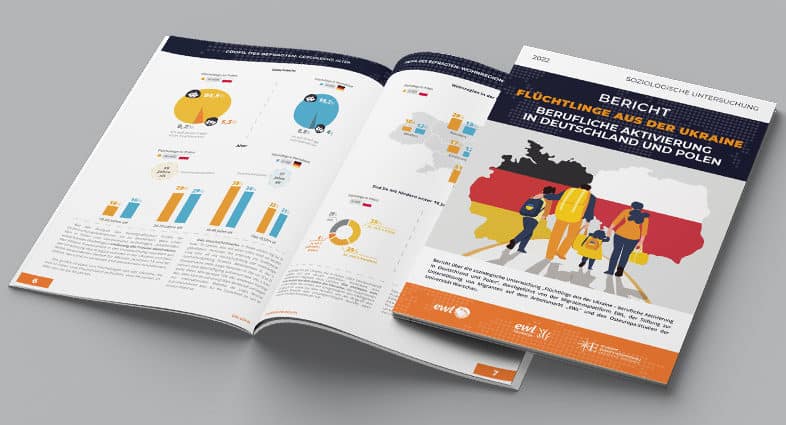Poland is doing a better job of activating Ukrainian refugees than Germany, which is sounding the alarm over a shortage of labor, according to a study, Deutsche Welle reported on October 20.
A research report on the test of labor activation of Ukrainian refugees from Poland and Germany, compiled by the EWL Group migration platform, which mediates jobs for foreigners, and the University of Warsaw’s Centre for East European Studies, was presented in Berlin on Thursday (20/10/2022). It was compiled on the basis of interviews conducted with refugees in Poland and Germany. The respondent groups consisted of 400 people each.
– Refugees from Ukraine have shown that they need a fishing rod, not a fish. Most do not want to live at the expense of their host societies, but are working or planning to take jobs
– EWL Group CEO Andrzej Korkus said during the presentation of the report.
It shows that Poland has coped better with the challenge of vocational activation of refugees from Ukraine than Germany, although in the latter country the number of vacancies is many times higher, and employers in almost all sectors complain of a shortage of hands, especially in highly skilled positions. The problem in the labor activation of refugees from Ukraine is often the unfamiliarity or insufficient knowledge of the language of the country of residence, but also long procedures and bureaucratic barriers.
Educated refugees choose Germany
According to UNHCR data, 5.95 million refugees have entered Poland since the beginning of the Russian assault on Ukraine, up to about 1 million in Germany. More than 90 percent of them are women. Temporary protection has been granted to 1.36 million people in Poland, and 655,000 in Germany. As Korkus points out, some 430,000 refugees from Ukraine, or about two-thirds of the number of refugees of working age (representing 670,000 people), have found work in Poland since the outbreak of the war. In the case of Germany, it was difficult for the study’s authors to obtain official data on the employment of Ukrainian refugees throughout the country, but the Ifo economic research institute in Munich estimates that the number is about 160,000 people.
Interviews conducted by the study’s authors show that Poland is chosen by Ukrainian refugees primarily because it is the largest neighboring country in the West and the closest to them culturally and linguistically. In turn, they often head to Germany for reasons related to their aspirations: they point out that it is the most economically developed country in Europe.
Somewhat better educated people go beyond the Oder River. In Germany, 60 percent of Ukrainian refugees interviewed by interviewers had a higher education. In Poland, it was 46 percent. This is a huge pool of talent that employers need,“ Korkus said.
Language barrier to overcome
One in five Ukrainian refugees working in Germany speaks English at a good level, which, according to the survey’s authors, may be due to the significant proportion of young people (16 percent are aged 18-25). At the same time, more than half (55 percent in Germany and 53 percent in Poland) do not know the language of the host country, or know it poorly, which weakens their chances in the labor market. In both countries, however, the majority of refugees surveyed said they were either learning the language of their country of residence or planning to take up learning.
In Germany, it is poor language skills that is one of the main concerns refugees have about staying abroad – right after concern for loved ones who have remained in Ukraine. Only 16 percent of Ukrainian refugees employed in Germany are able to communicate in their native language in the workplace. Meanwhile, in Poland, the percentage is four times higher (68 percent) – thanks, among other things, to the employment of Ukrainian citizens who speak Polish in managerial positions.
In both countries, refugees from Ukraine work primarily in the hotel and restaurant sector (about 30 percent), services, trade and industrial production. In Germany, relatively many (10 percent) have found employment in the elderly care and domestic help sectors. According to the report, the average monthly bay of refugees employed in Germany is 1,467 euros net, while in Poland it is 541 euros net. The research showed that many Ukrainian refugees who find employment are doing jobs below their qualifications, noted Michalina Sielewicz, director of international development at EWL Group. „The German service and trade sector has brought together representatives of most professions, including managers and managers of highly skilled professionals, teachers and education workers, office workers or blue-collar workers,“ the report reads.
According to its authors, deregulation of certain professions, speeding up and simplifying the procedures for Ukrainian refugees to stay and take up work in Germany can help to activate them professionally, which is among the key forms of support for Ukrainians fleeing the war. The sooner they are allowed to work, the sooner they will be able to support themselves, Sielewicz argued.


